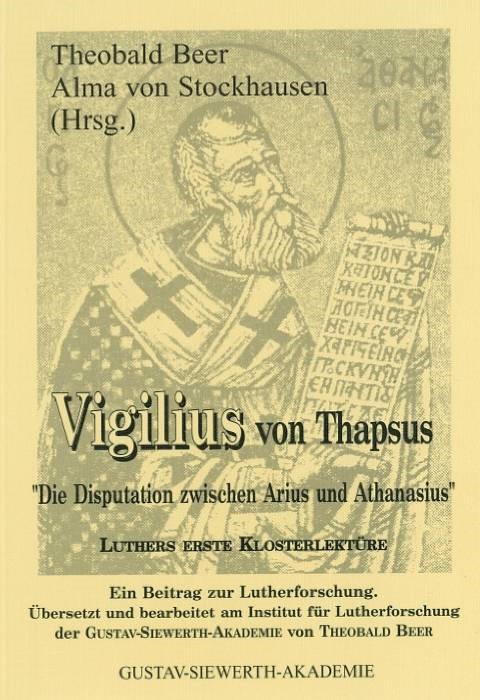– Anastasios
About Vigilius of Thapsus we know not much. Thapsus was a now-defunct Catholic diocese, in what would be modern Tunisia. We have some information in the Manuale di Patrologia by PG Franceschini, a text that we have used as a guide for lots of these profiles. But even if this text is quite detailed, neither can we find in it a lot about our Bishop of Thapsus.
He lived in the second half of the 5th century. He was a very prolific write and maybe out of modesty he decided to sign his works with pseudonyms, like Augustine or Athanasius. Among his works we remember De Trinitate and his work against Arians. In the Dictionary of Christian Biography and Literature (edited by Henry Wace and William Coleman Piercy) we can find these informations about him: “Vigilius Thapsensis, an African bishop mentioned in the Notitia published at the end of the Historia of Victor Vitensis, was present at the conference convened by the Vandal Hunneric in 484. He belonged to the Byzacene province, and was banished by the Vandal king. He seems to have fled to Constantinople, where he wrote against Eutychianism and Arianism. He published one work alone under his own name, viz. his five books against Eutyches, stating very clearly the usual arguments against the Eutychian system. An extremely good and copious analysis of it is in Ceillier (x. 472–485). It is an interesting specimen of 5th and 6th cent. controversy, and shews the evolution of thought among the Eutychians who in his day had not completed or thought out their system. They had not fixed, e.g., on a date for the disappearance of Christ’s human nature. A cent. or so later they determined upon the resurrection as the time when the human nature was swallowed up in the divine. Vigilius refers to this in bk. i. as a view taught by some, not by all. In bk. iv. he discusses the Tome of St. Leo and the orthodoxy of the decrees of Chalcedon, and has some remarks, important for liturgiology, on the form of the creed used at Rome (“Creed,” D. C. B. 4-vol. ed.). He defends St Leo on the ground that he quoted the creed used in the Romish church from apostolic times. Vigilius wrote several works under various distinguished names. Thus Chifflet, whose is the best edition (Dijon, 1664) of his writings, attributes to him a dialogue in 12 books on the Trinity, printed among the works of St Athanasius, a treatise against an Arian called Varimadus published under the name of Idacius Clarus, a book against Felicianus the Arian under that of St. Augustine; and two conferences, in which he represents Athanasius as disputing against Arius before a judge named Probus, who of course gives sentence against Arius. These conferences he published in two editions, one in two books, where Athanasius and Arius alone appear; another in three books, in which Sabellius and Photinus are introduced. His authorship of these conferences is absolutely certain, because in his contra Eutych. (bk. v. p. 58) he speaks of his argument “in eis libris quos adversus Sabellium, Photinum et Arianum sub nomine Athanasii, conscripsimus.” Chifflet also ascribes to him a treatise against Palladius, an Arian bishop, printed among the works of St. Ambrose and of Gregory Nazianzen, and also the Acts of the council of Aquileia found among the Epp. of St Ambrose. The Athanasian Creed has also been attributed to him, chiefly because both in the creed and in his treatise against Eutyches the union of two natures in man is brought forward as an explanation of the union of two natures in the one person of Jesus Christ. Chifflet’s edition and elaborate commentary, which includes the works of Victor Vitensis, is reprinted by Migne, Patr. Lat. t. lxii.”
We can really consider how the first centuries of Christianity were so involved with fighting heresies and that maybe we should understand that apologetics, the defense of Christianity from heresies and errors, is not just and hobby of some people but should be an important part in the formation we have as Christians. And especially for those who live in those parts of the world where Christianity is not prevalent (or is no longer prevalent, as happens also in the West), a strong apologetics is the only remedy to avoid that Christians be led astray.


 Follow
Follow


